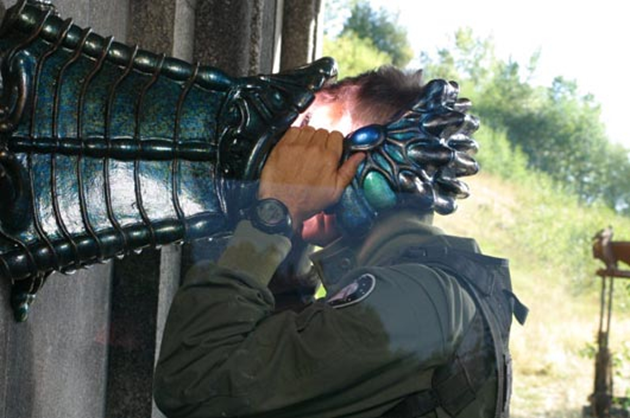
Stargate SG-1 and its sequels, Atlantis and Universe, are full of technologies that run the gamut from fantastic to scientifically plausible. In a universe of superweapons and sentient nanotechnology, where Faster-than-Light Drives make intergalactic travel routine, perhaps the most awe-inspiring technology is the Repository of Knowledge, an ancient information storage device found on the planet P3R-272.
The Repository was one of the final labors of a species called the Ancients before their evolutionary ascension, when they shed their physical form for an existence as pure energy. Containing all of the technological and social advancements the Ancients had achieved, the Repository is capable of downloading tens of millions of years of data directly into the mind of a recipient, using a concentrated beam of light. Initially, the recipient achieves astonishing levels of understanding and is able to produce technological leaps and insights far beyond human capabilities. The Repository is used on two separate occasions to provide the key to defeating implacable alien aggressors, but those victories come at great cost.
Overwhelmed by the influx of data, the recipient slowly loses their sanity; their neural structure begins to burn out from the sheer electrical stress placed on the synaptic pathways. But in the interim, prior to complete burnout and death, the newly endowed individual can utilize the knowledge of the Ancients. Colonel Jack O’Neill, pictured above, uses this knowledge to create a generator with capacity to rival the Western U.S. Interconnection power grid, allowing humanity to dial a distant galaxy and begin one of their most important diplomatic relationships, a partnership with the technologically advanced Asgard.
Vast amounts of information are also readily available, virtually anytime and anywhere, in our modern technological paradigm. We can do amazing things with so much raw data, but our human capacity for critical analysis can be overwhelmed quite quickly, resulting in a cognitive overload. Careful attention to methods of information delivery and to curating high-quality content are fundamental to creating an environment for sustained learning and critical thinking.
Experience and socialization help to break down the large amounts of information acquired over a lifetime into more easily consumable portions. Conversely, the Repository’s undifferentiated flood of information is the antithesis of contemporary learning theory, eschewing the natural path whereby we acquire knowledge gradually through experience. Nevertheless, the Repository’s allure is undeniable: curiosity, study, and research help to fulfill our fundamental desire to acquire answers to questions beyond our current comprehension. The Repository’s devastating cognitive effects remind us that knowledge acquired through effort, patience, and trial is the most valuable and useful kind.
This piece is part of Science Fiction Frames: a series of incisive analyses, thoughtful meditations, wild theories, close readings, and speculative leaps jumping off from a single frame of a science fiction film or television show. If you would like to contribute to the series or learn more, email us at imagination@asu.edu.
